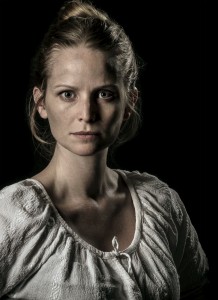
Credit: Richard Norrish
Posted on August 10, 2013
Keeping the wolf from the door is about keeping food on the table. By the time the wolves come howling, the occupants are starving – easy pickings for packs of hungry canines. But there are other disasters that can destroy a family and they can be as simple – and as painful – as a clash of ideals.
In this world premiere of Tina Teeninga’s play, produced by Otherwise Productions and directed by Kerri Norris, the Grenfell family and their Yorkshire, England neighbours are starving. They are artisan weavers who have been providing surrounding villages with beautiful hand-woven garments for generations. But the Industrial Revolution has arrived in Yorkshire and the cheap woolen goods that the recently arrived factory turns out are eagerly being bought up, leaving all the weavers with a dwindling clientele.
Rumours of long hours in the factory, of beatings and withheld wages, further fuel the weavers’ anger; what kind of life does factory work provide? The pay is okay but gone is pride in one’s work; it’s just a step above slave labour.
The subject obviously resonates with today’s society and its desire for cheaper and ever cheaper goods from offshore.
But the conclusion of Teeninga’s play leaves a bitter taste. Matthias Grenfell (Byron Noble), husband of Susanna (Rebecca deBoer) and father of Sarah (Kyla Ferrier) and Harriet (Kirsty Provan) fights the good fight – even putting young Harriet at risk when he involves her in a plot to destroy the factory. But as a god-fearing man, he doesn’t seem to be the kind of man that would resort to violence; and as a thinking man, he must surely realize the factory will be rebuilt or another one will replace it. The writing, as they say, is on the wall.

Credit: Richard Norrish
But there is much dissension amidst the Grenfells: Sarah has fallen in love with Percy Newman (Tim Bratton), son of the factory owner, and she sees benefits for her community in the factory. Harriet, on the other hand, is a firebrand like her father and eager to join the Luddites (although in this production she appears to be about ten years old and too young to be a card-carrying member) in their opposition to mechanization. Susanna, ever the intermediary, sees both sides but remains loyal to her husband.
Wolf at the Door starts in an argumentative, angry place and it stays there. Noble has nowhere to go but louder and angrier. On opening night, Ferrier (as Sarah) appeared tentative and Provan suffers from being cast as a character of indeterminate age. At times she appears to be about eight; at other times, possibly teenaged. It’s an awkward place for an actor to find herself in and perhaps director Norris could have helped her here. deBoer, however, is lovely and loving as Susanna. There is a quiet, unhurried element to deBoer’s style that is perfectly in keeping with this character.
Molly Lai provides a simple, rustic-looking set with a loom (on which Noble appears to weave) that collapses and disappears into a tabletop. Quite ingenious.
Ferrier provides some original music and songs that, although very pretty and folksy, feel like an afterthought.
Phil Miguel’s lighting is warm and cozy and Kaitlin Williams’ costumes are appropriately cottony and well-worn looking.
Adam Weidl, Lori Kokotailo and Teeninga complete the cast.
I felt disappointed at curtain. Teeninga’s primary question – does the welfare of the family trump a man’s convictions – is one that begs a more satisfying answer. From my perspective Matthias looked more like a whipped dog than a family man proud to be keeping the wolf from the door. It’s a Faustian bargain he makes and look where it got Faust.

